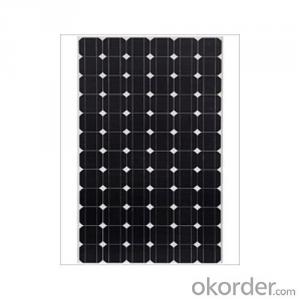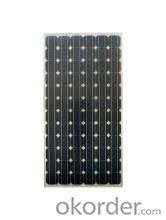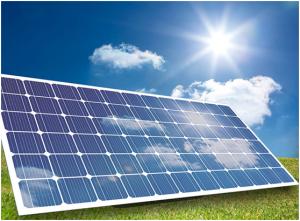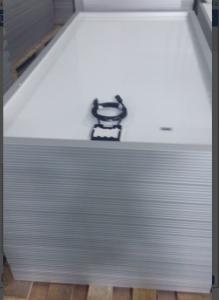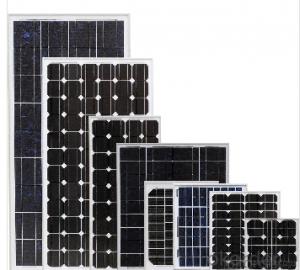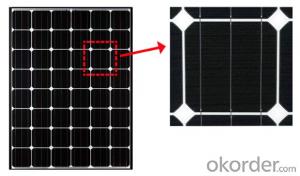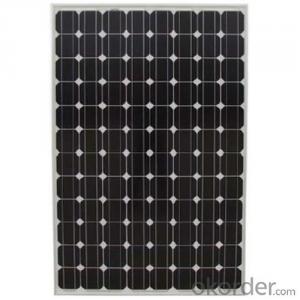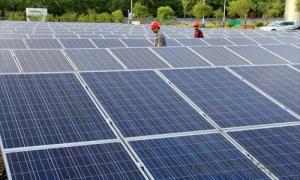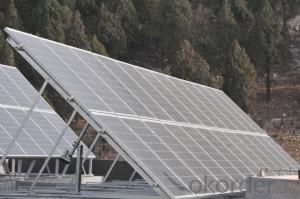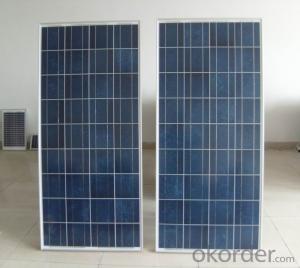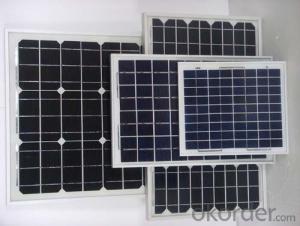Solar Panels in Ma - Solar Monocrystalline 125mm Series (120w-130w)
- Loading Port:
- Shanghai
- Payment Terms:
- TT OR LC
- Min Order Qty:
- 1000 watt
- Supply Capability:
- 20000000 watt/month
OKorder Service Pledge
OKorder Financial Service
You Might Also Like
Specification
1.Description of the Solar Module
Solar Monocrytalline 125mm Series (120W-----130W)
The making craft of polycrystalline silicon solar panels with monocrystalline silicon solar panels is similar, but the photoelectric conversion efficiency of polycrystalline silicon solar panels to reduce a lot, the photoelectric conversion efficiency is about 12% (on July 1, 2004, Japan's sharp market efficiency for 14.8% of the world's highest efficiency of polycrystalline silicon solar panels). In terms of production cost is cheaper than monocrystalline silicon solar panels, material is simple, save power consumption, the total production cost is low, so get a lot of development. In addition, the service life of the polycrystalline silicon solar panels is shorter than monocrystalline silicon solar panels. As for the price performance ratio, monocrystalline silicon solar panels is slightly better.
2.Characteristics of the Solar Module
Max Power Voltage Vmp (V) | 18.0 | 18.2 |
Max Power Current Imp (A) | 6.67 | 7.14 |
Open Circuit Voltage Voc (V) | 22.6 | 22.8 |
Short Circuit Current Isc (A) | 7.08 | 7.60 |
Max Power Pm(W) | 120 | 130 |
3.Limits of the Solar Module
Operating Temperature | ﹣40℃to+85℃ |
Storage Temperature | ﹣40℃to+85℃ |
Max System Voltage | 700V |
4.Specifications of the Solar Module
Power | 120W/130W |
Dimension | 1060x820x30mm |
Weight | 10.3kg |
Tolerance | ±3% |
The dimension of the modules can be changed according to the demand of clients
5.Guarantee of the Solar Module
Products Guarantee | 2 yrs free from defects in materials and
workmanship |
Performance Guarantee | No less than 90% within 10yrs and no less than 80% within 20yrs |
Certificates | IEC,ISO,TUV,CE |
6.Applications of the Solar Module
1.Electricity
2.Heat energy
7.IMages of the Solar Module
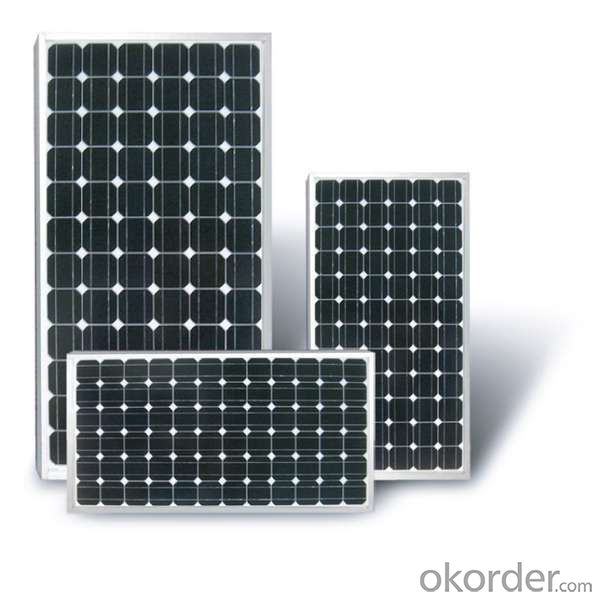
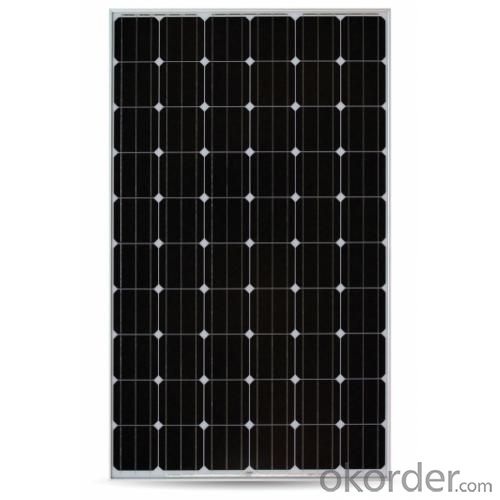
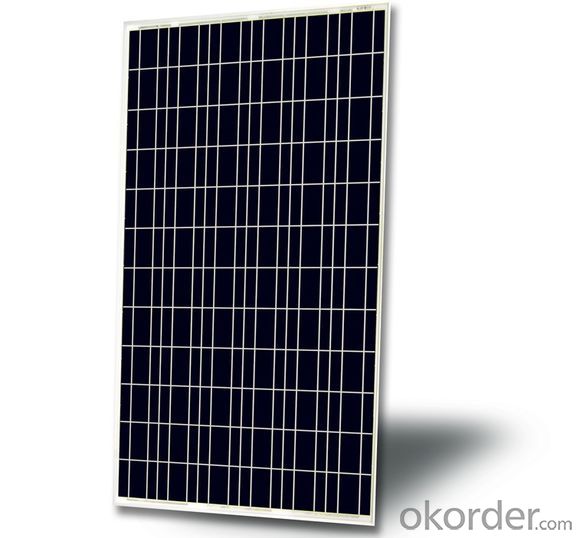
FAQ
1. Q: Do you have your own factory?
A: Yes, we have. Our factory located in Jiangyin city, jiangsu province.
2. Q: How can I visit your factory?
A: Before you take off from your country, please let us know. We will show you the way,or arrange time to pick you up if possible.
3. Q: Do you provide free sample?
A: Usually we do not offer free sample
4. Q: Could you print our company LOGO on the nameplate and package?
A: Yes, we can do that.
- Q: Hey guys :)Well I'm in the middle of doing my PSHCE coursework on sustainable energy, focusing on solar panels. I just wanted to ask you what your opinions are of them? Are they really worth it? Are they sustainable? Will they reduce our energy bills? Those sort of questions :)If you are interested in installing solar panels, please mention that, as it would be great! There's lots of information about them on this site ----
- I have a boat in a sunny place and four 80 watt panels. These will run my fridge Tv and a few LED's. I still have to run my engine for hot water and washing machine. My Batteries only last a few years and are a real pain. I go on the mains when I can to get the batteries topped up. The panels are ok if there is nothing else, they are not the answer to the future of energy supply. There is also the moral aspect of the feed in tariff. For the rich to load their electricity bill onto the less well off is not acceptable and those panels on the roof tell all your neighbors that you are doing it. That will show a greedy selfish attitude. If they are any good why don't the power companies buy them and save buying coal?
- Q: Can solar panels be used in countries with limited sunlight?
- Yes, solar panels can still be used in countries with limited sunlight. While solar panels are most effective in regions with abundant sunlight, they can still generate electricity in areas with less sunlight. Even countries with limited sunlight exposure can benefit from solar energy by utilizing advanced solar technologies and optimizing panel placement to maximize energy production. Additionally, solar panels can still generate electricity on cloudy or overcast days, although at a reduced efficiency compared to sunny days.
- Q: How do solar panels affect the property's community engagement?
- Solar panels can positively impact a property's community engagement by promoting sustainability and renewable energy. They serve as a visible and tangible example of the property's commitment to reducing its carbon footprint, which can inspire others in the community to adopt similar practices. Additionally, solar panels often generate excess energy that can be shared with the community, fostering a sense of collaboration and local energy independence.
- Q: Are you a Solar Panel Specialist/Genius/Enthusiast?
- No, just an amateur. I guess that could be called an Enthusiast. I think most people find the topic somewhat interesting, some more than others. Why do you ask?
- Q: Need solar panel info with dimensions and also the total cost of the whole equipment for setting up of the required solar panels for a 2-story home
- Please excuse my bluntness, but you are not ready to ask these questions. This is a very complex issue. The how many question depends on what you expect of the system. Are you attempting to be off the grid? If so the system will have to supply all of your electrical needs, including those at night. You would need batteries. If you will be on the grid and want to supply all your electrical needs, your system will have to average the total daily usage. This will vary from one season to the next, so you will need to find out your annual usage. If you just want to reduce your electric bill, you need to pick the acceptable installation cost, and work with it to determine what it will buy In your shoes I would do some studying. Check out solar panels in the green search box above, and on the Internet. This will help you ask questions that are easier for us to answer.
- Q: In nature, green leaves collect light and produce energy. Is this what they copied to make solar panels? If not how hard would it be to make artificial leaves that would power our homes?
- No, although they both use the capture of energy from electrons excited to a higher state by sunlight, plants use enzymes (mostly chlorophyll) packed in chloroplasts; solar panels still largely use silicon. There are some companies exploring the use of a plant enzyme-based process since it's so much more efficient. The farthest they've gotten is using organic nanocrystal pigments instead of silicon crystals.
- Q: Can solar panels be used to power swimming pools?
- Yes, solar panels can indeed be used to power swimming pools. Solar panels can generate electricity from sunlight, which can be used to operate pool pumps, heaters, and other equipment, reducing the reliance on traditional electricity sources and saving on energy costs.
- Q: How do solar panels affect the insurance premiums of a property?
- Solar panels can have both positive and negative effects on insurance premiums. On one hand, having solar panels installed on a property can increase its overall value, which may lead to higher replacement costs in case of damage or loss. This could potentially increase insurance premiums. However, many insurance companies also offer discounts for properties with solar panels, as they are considered a risk mitigation measure. The extent to which solar panels affect insurance premiums can vary depending on the specific policies and guidelines of the insurance provider.
- Q: I need to have more information about what are solar panels. will you help me?
- Solar panels are made up of lots of solar cells. They don't give loads of energy. A line goes around the cells and... that's all I know lol
- Q: I need to know how Solar panels work please help me!! Also, if you know any other additional important information about Solar Energy in General please tell me, Thanks.
- Guide okorder /
Send your message to us
Solar Panels in Ma - Solar Monocrystalline 125mm Series (120w-130w)
- Loading Port:
- Shanghai
- Payment Terms:
- TT OR LC
- Min Order Qty:
- 1000 watt
- Supply Capability:
- 20000000 watt/month
OKorder Service Pledge
OKorder Financial Service
Similar products
Hot products
Hot Searches
